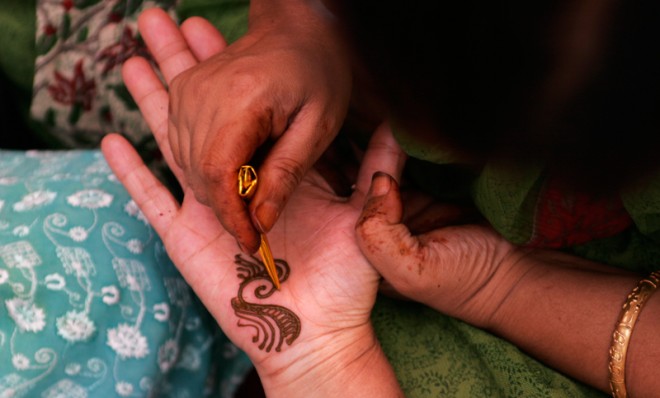Why temporary tattoos have the FDA worried
Some beachside kiosks are using "black henna" infused with a banned chemical

Temporary tattoos are supposed to be a lighthearted and noncommittal alternative to the far more permanent inking of your flesh. As such, temporary tattoos usually aren't dangerous — they're a flight of whimsy, after all. But a certain type of "black henna" being used in some temporary tattoos has led to an usually high number of allergic reactions across the country.
According to a Food and Drug Administration news release, the skin-staining dark ink in black henna has caused severe and long-lasting allergic reactions, including "redness, blisters, raised red weeping lesions, loss of pigmentation, increased sensitivity to sunlight, and even permanent scarring."
Henna, which is supposed to last anywhere from three days to three weeks, is popular at beachside temporary tattoo kiosks, and has long been used as a symbol of good luck during Arab and Indian cultural celebrations. However, "just because a tattoo is temporary it doesn't mean that it is risk free," says Dr. Linda Kat, director of the FDA's Office of Cosmetics and Colors. Typically made from a plant-based coloring that grows in the tropical and subtropical regions of Africa and Asia, today's black henna, which helps ink stay visible longer, is sometimes infused with a toxic chemical called p-phenylenediamine (PPD).
The Week
Escape your echo chamber. Get the facts behind the news, plus analysis from multiple perspectives.

Sign up for The Week's Free Newsletters
From our morning news briefing to a weekly Good News Newsletter, get the best of The Week delivered directly to your inbox.
From our morning news briefing to a weekly Good News Newsletter, get the best of The Week delivered directly to your inbox.
PPD, which has long been banned from skin cosmetics, is sometimes used in dark hair dye and can be harmful to some people. According to Michelle Castillo at CBS News, a 5-year-old-girl who had gotten a temporary tattoo with black henna had red marks appear on her forearm for two weeks. Another teenage girl had scars form on her back where a black henna tattoo was applied, "despite the fact that she had red henna tattoos before and never had a negative reaction."
Says the five-year-old girl's father: "What we thought would be a little harmless fun ended up becoming more like a nightmare for us."
Symptoms from adverse skin allergies may not appear instantaneously, sometimes taking as long as two or three weeks to show up. If you encounter any allergic reactions from temporary tattoo ink, the FDA is asking that you call MedWatch.
A free daily email with the biggest news stories of the day – and the best features from TheWeek.com
-
 Political cartoons for February 1
Political cartoons for February 1Cartoons Sunday's political cartoons include Tom Homan's offer, the Fox News filter, and more
-
 Will SpaceX, OpenAI and Anthropic make 2026 the year of mega tech listings?
Will SpaceX, OpenAI and Anthropic make 2026 the year of mega tech listings?In Depth SpaceX float may come as soon as this year, and would be the largest IPO in history
-
 Reforming the House of Lords
Reforming the House of LordsThe Explainer Keir Starmer’s government regards reform of the House of Lords as ‘long overdue and essential’